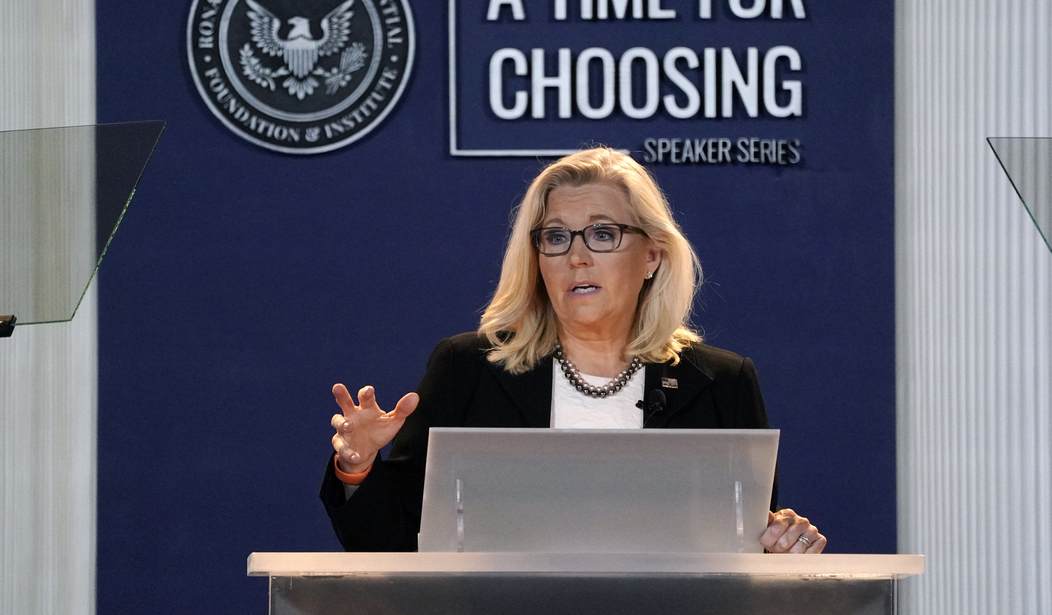We're now a little over a month away from the Wyoming primary, in which Rep. Liz Cheney will face Harriet Hageman, a challenger backed by former President Donald Trump. As Harry Enten highlighted for CNN on Thursday, Cheney "is in a lot of trouble."
Some local outlets in Wyoming have criticized the polling is out there, which Enten acknowledges is limited. He does offer what's out there is "illuminative," including a larger academic survey that asks how constituents feel about their member of Congress:
Polling from Wyoming is limited, but what does exist paints an ominous picture. The Cooperative Election Study (CES), a large academic survey, asks Americans whether they approve or disapprove of their member of Congress. The sample sizes in each district are usually in the lower 100s or fewer, though the trend is illuminative.
Cheney sported a 72% disapproval rating in the late 2021 edition of the survey, which was fielded about 10 months after she voted to impeach Trump. That was up nearly 40 points from her 26% disapproval rating in the late 2020 version, which was fielded before Cheney's vote. All told, Cheney was the least popular member of Congress in the 2021 survey.
This lines up with what more recent internal polling of the August Republican primary for Cheney's at-large House seat in Wyoming is showing -- Cheney is behind, one of her challengers, the Trump-endorsed Harriet Hageman, by a significant margin.
Now, we should treat this data with caution since the people releasing it likely have their own motives, such as rooting for Cheney to lose. Still, the congresswoman trailing makes a lot of sense given what the nonpartisan polling in Wyoming has indicated.
Further, national polls seem to confirm the bad data in Wyoming for Cheney. A mere 17% of Republicans nationwide approved of Cheney's job as vice chair of the January 6 committee, according to a recent Quinnipiac University poll. The vast majority (61%) disapproved.
Why is this notable? Because the vast majority of Wyomingites are Republicans. According to the Wyoming secretary of state, 71% of registered voters are Republicans. Just 15% are Democrats.
Recommended
Enten points to how Cheney's strategy looks to be depending on Democrats, and opens his piece by reminding how much of a darling she's become among Democrats and the media, an "unexpected hero," even. "But we shouldn't mistake adoring press coverage and bipartisan bona fides for popularity in the place where popularity matters most for Cheney: Wyoming," he still cautions.
And, as Enten points to in the excerpt above, Wyoming has hardly any Democrats. Further, these handful of Democrats would have to switch their party in order to vote for Cheney, as Wyoming is an open partisan state with partisan registration. That means "[v]oters who are already affiliated with a political party- Republican, Democrat or minor party- can vote only in that party’s primary," according to Open Primaries.
More factors going against Cheney is how fellow Republicans who voted to impeach Trump have fared in their primary races. Last month, Rep. Tom Rice (R-SC) lost by double digits to Trump-backed challenger Russell Fry. A runoff was avoided as Fry managed to get 51.06 percent of the vote to Rice's 24.56 percent.
Enten also mentions how Rep. David Valadao (R-CA) did advance to the general election, but that he did so in a nonpartisan primary with just 26 percent of the vote. Among those who voted for Republican candidates in the June primary, just 47 percent did for Valadao, which Enten says "is weak for an incumbent." The 26 percent "was by far his lowest share in any nonpartisan California primary since he first ran for Congress in 2012," Enten noted as well. Democrat Rudy Salas, meanwhile, advanced with 45 percent.
Then there's the fundraising numbers. While Cheney has been lauded before for her fundraising amounts, much more of Hageman's money comes from Wyoming than Cheney's money, to the tune of nearly $650,000 to about $270,000. That's more than double.
That's a lot of what we've been hearing and covering before when it comes to Cheney's chances, but the congresswoman is also running out of time and paths to victory, and seems to be doing herself no favors with her constituents. As Enten closes with, while it "doesn't mean Cheney can't win," he does believe it would be "quite surprising" if she did.

























Join the conversation as a VIP Member